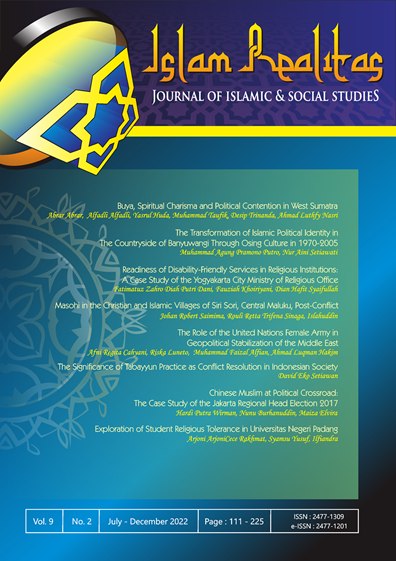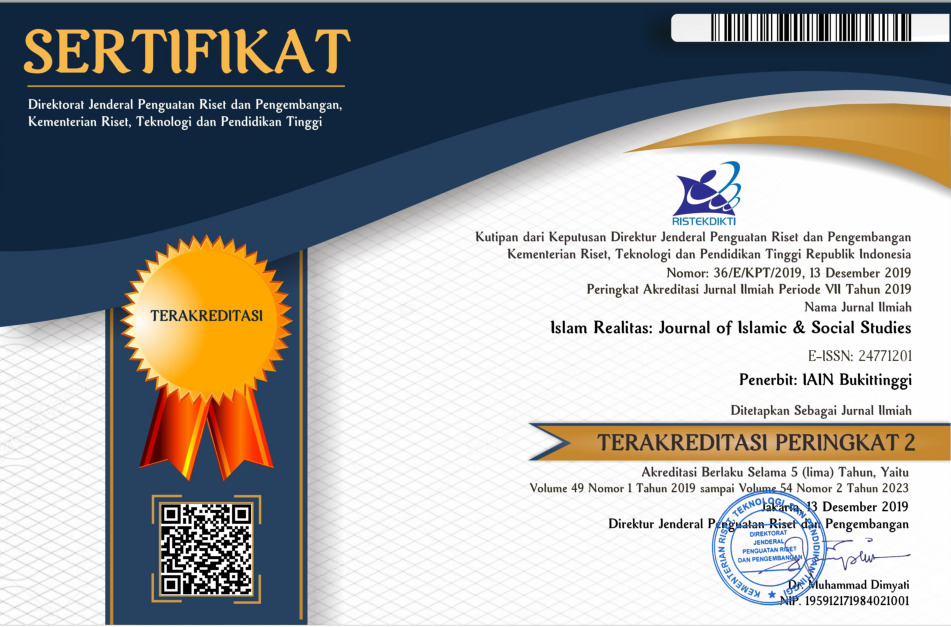Readiness of Disability-Friendly Services in Religious Institutions: A Case Study of the Yogyakarta City Ministry of Religious Office
DOI:
https://doi.org/10.30983/islam_realitas.v8i2.5920Keywords:
Barriers, Disability, Facilities, Religious Service, SupportAbstract
This article aims to analyze the availability of facilities for persons with disabilities as well as the challenges in implementing accessible spaces and facilities at the Yogyakarta City Office of the Ministry of Religious Affairs (Kankemenag of Yogyakarta City). This study used a qualitative approach by exploring the social situation related to providing disability-friendly public services in religious institutions. The collected data, both primary and secondary, were analyzed using Miles Huberman's analysis. Based on the observations, Kankemenag of Yogyakarta City provided adequate facilities for persons with disabilities. Some of the facilities available include toilets for the diffable (a person who is differently abled), visitor parking, special service counters, guiding blocks, downhill fields, and wheelchairs. The supporting factors of Kankemenag of Yogyakarta City can provide facilities for service users sourced from internal and external factors. The internal supporting factor found in the field is the commitment and mindset of the head from the Chief to the service officers. Meanwhile, the external factors supporting this case are more about the obligation to meet the requirements to achieve the xcellent Service title. The Ontario Human Rights Commission developed the barriers factor in providing facilities for those with special needs in public service, which consists of attitudinal, architectural, and informational barriers. The diverse scope of the study is strongly recommended to provide a broader picture of providing facilities for persons with disabilities in various places. This study is expected to improve public services in government agencies that are fair and equitable for all levels of society.
References
Books
AL-Ansori, Ade Nasihudin, ‘Kota Ramah Disabilitas, 10 Kecamatan Di Yogyakarta Sudah Inklusif’, Viva.Com, 2019, p. 1
ILO, ‘Inklusi Penyandang Disabilitas Di Indonesia’, International Labor Oranization (Jakarta, 2013), 1–4
Kemensos, ‘Kemensos Dorong Aksesibilitas Informasi Ramah Penyandang Disabilitas’, Kemensos.Go.Id, 2020, p. 1
Humas, ‘Maju Evaluasi Pelayanan KemenPAN RB, Kemenag DIY Dukung Penuh Kankemenag Kota Yogyakarta’, Kantor Kementerian Agama Kota Yogyakarta, 2020
Journals
Anshar, Muh, Rhiza Sadjad, Dewiani, Muhammad Abry, Ryan Prayudha, Fiqhi, and others, ‘Control System Design for Smart Wheelchair Robot’, in AIP Conference Proceedings (AIP Publishing, 2022), MMDXLIII, 10–13 <https://doi.org/10.1063/5.0095676>
Arthaya, Bagus, Kristiana A. Damayanti, and Rosiana Dewi, ‘Dedicated Facilities for Wheelchair Users When Utilizing “Transjakarta Busway†Transportation System’, in Proceedings - APCHI-ERGOFUTURE 2010 (Bandung: Parahyangan Catholic University, 2010), pp. 44–49 <https://doi.org/978-602856685-8>
Awais, Sania, and Kanwal Ameen, ‘Information Accessibility for Students with Disabilities: An Exploratory Study of Pakistan’, Malaysian Journal of Library and Information Science, 20.2 (2015), 103–15
Banda-Chalwe, Martha, Jennifer C. Nitz, and Desleigh De Jonge, ‘Impact of Inaccessible Spaces on Community Participation of People with Mobility Limitations in Zambia’, African Journal of Disability, 3.1 (2014) <https://doi.org/10.4102/ajod.v3i1.33>
Berget, Gerd, ‘Making Health Information Accessible for All: The Impact of Universal Design in Public Libraries’, in Roles and Responsibilities of Libraries in Increasing Consumer Health Literacy and Reducing Health Disparities, ed. by Beth St. Jean, Gagan Jindal, Yuting Liao, and Paul T Jaeger, Advances in Librarianship (Emerald Publishing Limited, 2020), XLVII, 141–57 <https://doi.org/10.1108/S0065-283020200000047007>
Bonaccio, Silvia, Catherine E. Connelly, Ian R. Gellatly, Arif Jetha, and Kathleen A. Martin Ginis, ‘The Participation of People with Disabilities in the Workplace Across the Employment Cycle: Employer Concerns and Research Evidence’, Journal of Business and Psychology, 35.2 (2020), 135–58 <https://doi.org/10.1007/s10869-018-9602-5>
Bowe, Frank, Handicapping America: Barriers to Disabled People (HarperCollins Publishers, 1978) <https://doi.org/https://doi.org/10.1002/1520-6807(198004)17:2<286::AID-PITS2310170225>3.0.CO;2-I>
Carlsson, G., B. Slaug, S. M. Schmidt, L. Norin, E. Ronchi, and G. Gefenaite, ‘A Scoping Review of Public Building Accessibility’, Disability and Health Journal, 15.2 (2022), 101227 <https://doi.org/10.1016/j.dhjo.2021.101227>
ESCAP, Disability at a Glance 2015: Strengthening Employment Prospects for Persons with Disabilities in Asia and the Pacific, United Nation, 5th edn (Bangkok: Economic and Social Commission for Asia and the Pacific, 2015)
Fajri, Nursyamsi, Muhammad Nur Ramadhan, Herman Palani, and Ega Kurnia Yazid, Kajian Disabilitas, Tinjauan Peningkatan Akses Dan Taraf Hidup Penyandang Disabilitas Indonesia : Aspek Sosioekonomi Dan Yuridis, ed. by Vivi Yulaswati, 1st edn (Jakarta: Staf Ahli Menteri Bidang Sosial dan Penanggulangan Kemiskinan, Kementerian PPN/Bappenas, 2021)
Gubernur Daerah Istimewa Yogyakarta, Peraturan Gubernur Daerah Istimewa Yogyakarta Nomor Nomor 4 Tahun 2019 Tentang Pemajuan, Pelindungan, Dan Pemenuhan Hak-Hak Penyandang Disabilitas (DIY, 2019)
Halalia, Mugi Riskiana, ‘Pemenuhan Hak Politik Penyandang Disabilitas Sesuai Dengan Undang-Undang Nomor 8 Tahun 2016 Tentang Penyandang Disabilitas Oleh Komisi Pemilihan Umum (KPU) Kota Yogyakarta By : Mugi Riskiana Halalia **’, Jurnal Supremasi Hukum, 6.2 (2017), 1–24
Heldak, Maria, Agnieszka Stacherzak, and Katarzyna Przybyla, ‘Demand and Financial Constraints in Eliminating Architectural and Technical Barriers for People with Disabilities in Poland’, Journal of Healthcare Engineering, 2018 (2018) <https://doi.org/10.1155/2018/1297396>
Idris, Maulana Fahmi, ‘Access To Justice For Disability In The Perspective Of John Rawls Theory (Case Of Demak Regecy Indonesia)’, Journal of Law and Legal Reform, 2.3 (2021), 54–56 <https://doi.org///doi.org/10.15294/jllr.v2i2.46486 ISSN>
Kinasih, Wihardiasty Sekar, and Sujianto Sujianto, ‘Pelaksanaan Pembangunan Zona Integritas Menuju Wilayah Bebas Korupsi Dan Wilayah Birokrasi Bersih Melayani Di Kantor Imigrasi Kelas I Tpi (Tempat Pemeriksaan Imigrasi) Pekanbaru’, PUBLIKA: Jurnal Ilmu Administrasi Publik, 8.1 (2022), 104–20 <https://doi.org/10.25299/jiap.2022.vol8(1).9308>
Liaaen, Janne Marita, Borgunn Ytterhus, and Sylvia Söderström, ‘Inaccessible Possibilities : Experiences of Using ICT to Engage with Services among Young Persons with Disabilities’, Disability and Rehabilitation: Assistive Technology, 2021, 1–8 <https://doi.org/10.1080/17483107.2021.2008530>
Miles, Matthew B., and A. Michael Huberman, Qualitative Data Analysis: An Expanded Sourcebook. (Thousand Oaks: SAGE Publications Ltd, 1994)
Mutia, Nilda, and Yanis Rinaldi, ‘Pelaksanaan Pelayanan Publik Bagi Penyandang Disabilitas Di Kota Banda Aceh’, Jurnal Ilmiah Mahasiswa, 1.1 (2017), 55–66
Nugent, Timothy J, ‘The Elimination of Architectural Barriers to the Physically Disabled’, Occupational Therapy: The Official Journal of the Association of Occupational Therapists, 25.11 (1962), 17–20 <https://doi.org/10.1177/030802266202501104>
Nurul, Sri, ‘Kakanwil, Apresiasi 2 Predikat , WBBM Dan Pelayanan Publik Kemenag Kota Yogyakarta’, Https://Yogyakartakota.Kemenag.Go.Id/, 2021
Omar, Muhd Khaizer, Nor Shailai Mat Ali, Mohd Hazwan Mohd Puad, Mohamad Yaakub, and Anis Zakaria, ‘Enabling Employment For People With Disability (Pwd): Readiness, Commitment, And Disposition Of Malaysian Employers’, International Journal of Entrepreneurship and Management Practices, 4.15 (2021), 01–22 <https://doi.org/10.35631/IJEMP.415001>
Qurana, Aan, and Eko Priyo Purnomo, ‘Accessibility Of People With Disabilities To Public Facilities In Yogyakarta City Aksesibilitas Penyandang Disabilitas Terhadap Fasilitas Umum Di Kota Yogyakarta Universitas Muhammadiyah Yogyakarta’, Journal of Politics and Policy, 3.1 (2020), 1–14
Rahayu, Sugi, and Utami Dewi, ‘Pelayanan Publik Bagi Pemenuhan Hak-Hak Disabilitas Di Kota Yogyakarta’, Natapraja, 1.1 (2013) <https://doi.org/10.21831/jnp.v1i1.3194>
Sabiq Fairuz, Fairuz, and Meliana Damayanti Meliana, ‘Implementation Of Public Facilities And Disability Treatments: A Comparison Between Indonesia And Malaysia’, in Advances in Social Science, Education and Humanities Research, 2018, CLIII, 11–15 <https://doi.org/10.2991/icddims-17.2018.3>
‘Sejarah’, Brtpd.Jogjaprov.Go.Id, p. 1
Septian, Eriando Rizky, and Ella Nurlaella Hadi, ‘Reducing Stigma of People with Disabilities: A Systematic Review’, Journal of Medical and Health Studies, 2.2 (2021), 31–37 <https://doi.org/10.32996/jmhs.2021.2.2.3>
Silvia, Firda, Pramashela Hadiyanto, and Abdul Rachim, ‘Aksesibilitas Pelayanan Publik Bagi Penyandang Disabilitas Di Indonesia’, Jurnal Pekerjaan Sosial, 4.2 (2021), 225–32 <http://jurnal.unpad.ac.id/focus/article/view/33529>
Siregar, Uly, ‘Kaum Disabilitas Masih “Dianaktirikan†Di Tanah Air’, DW.Com, 2021
Soleh, Akhmad, ‘Kebijakan Perguruan Tinggi Negeri Yogyakarta Terhadap Penyandang Disabilitas’, Jurnal Pendidikan Islam, 3.1 (2014), 1–30 <https://doi.org/10.14421/jpi.2014.31.1-30>
Syafi’ie, Muhammad, ‘Pemenuhan Aksesibilitas Bagi Penyandang Disabilitas’, Inklusi, 1.2 (2014), 269–90
Vergunst, R., L. Swartz, K.-G. Hem, A. H. Eide, H. Mannan, M. MacLachlan, and others, ‘Access to Health Care for Persons with Disabilities in Rural South Africa’, BMC Health Services Research, 17.1 (2017), 741 <https://doi.org/10.1186/s12913-017-2674-5>
Vincent, Claude, Rébecca Girard, Frédéric Dumont, Philippe Archambault, François Routhier, and Mir Abolfazl Mostafavi, ‘Evaluation of Satisfaction with Geospatial Assistive Technology (ESGAT): A Methodological and Usability Study’, Disability and Rehabilitation: Assistive Technology, 17.2 (2022), 134–51 <https://doi.org/10.1080/17483107.2020.1768307>
Wolf-Fordham, Susan B., Janet S. Twyman, and Charles D. Hamad, ‘Educating First Responders to Provide Emergency Services to Individuals with Disabilities’, Disaster Med Public Health Prep, 8.6 (2014), 533–40 <https://doi.org/10.1017/dmp.2014.129.Educating>
Downloads
Published
How to Cite
Issue
Section
Citation Check
License
Copyright (c) 2022 Fatimatuz Zahro Diah Putri Dani, Fauziah Khoiriyani, Dian Hafit Syaifullah

This work is licensed under a Creative Commons Attribution-ShareAlike 4.0 International License.
Authors who publish with this journal agree to the following terms:
- Authors retain copyright and grant the journal right of first publication with the work simultaneously licensed under a Creative Commons Attribution License that allows others to share the work with an acknowledgment of the work's authorship and initial publication in this journal.
- Authors are able to enter into separate, additional contractual arrangements for the non-exclusive distribution of the journal's published version of the work (e.g., post it to an institutional repository or publish it in a book), with an acknowledgment of its initial publication in this journal.
- Authors are permitted and encouraged to post their work online (e.g., in institutional repositories or on their website) prior to and during the submission process, as it can lead to productive exchanges, as well as earlier and greater citation of published work (See The Effect of Open Access).




